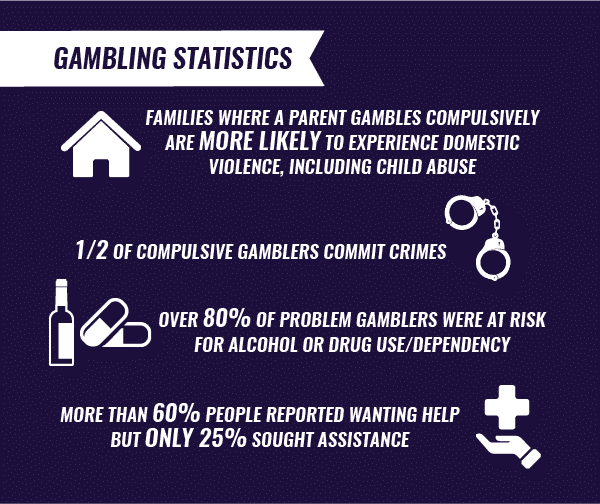Suspect that you or a loved one might live with gambling addiction? This mental health condition is more common than you may think.
As many as 10 million Americans live with a gambling addiction. The act of gambling itself is not illegal in most situations, which can make it easier for people to justify risky gambling behaviors. Unfortunately, most people who have a gambling addiction don’t see it as a problem. Only 21 percent of incarcerated individuals assessed as having gambling addiction thought that their gambling was problematic. Understanding gambling addiction facts can help reduce stigma and misunderstandings related to this disorder and make it easier to find access to professional treatment.
Gambling Trends
In most cases, gambling is legal and, for most people, not problematic. However, gambling trends indicate that the consequences can be dire for individuals who do develop a gambling problem. The advent of the internet has made gambling more accessible through online betting platforms and games of chance. As gambling becomes more easily accessed by more people, the number of lives negatively affected by gambling has also increased.
College Students and Gambling
Gambling among college students is on the rise. According to a combination of national studies, 1 in 20 college students meet the criteria for compulsive gambling. College student gambling statistics indicate that the rate of compulsive gambling among college students is more than double the rate of the overall adult population. One reason for these high rates may be the increased accessibility of gambling through the internet. Some studies indicate that 23 percent of college students report gambling online, with 6 percent doing so weekly.
Gambling and Domestic Violence
Compulsive gambling doesn’t just affect the person who gambles. Statistics indicate that families where a parent gambles compulsively are more likely to experience domestic violence, including child abuse. Even when gambling and domestic violence don’t coincide, children of parents with gambling addiction are more likely to develop depression, substance use and behavioral problems later in life.
Gambling and Criminal Activity
While gambling is legal in most states, gambling and crime frequently are related. Approximately half of compulsive gamblers commit crimes. Most of these crimes are related to obtaining money to gamble or to pay gambling debts. Common crimes related to compulsive gambling include fraud, forgery, embezzlement, larceny, shoplifting, burglary and petty theft. As compulsive gambling increases in severity, there is a correlation of increased criminal activity. Understanding this relationship requires a review of gambling and crime rate statistics:
- More than two-thirds of compulsive gamblers report committing crimes directly related to gambling, and approximately 40 percent of compulsive gamblers report the only crimes they commit are related to gambling
- 80 to 90 percent of individuals who attend Gamblers Anonymous report engaging in illegal acts to get money for gambling
- 63 percent of Gamblers Anonymous members reported writing bad checks, and approximately 30 percent reported stealing from work
- Nearly 70 percent of gamblers assessed as having a severe problem reported engaging in illegal acts relating to gambling, compared to roughly 26 percent assessed to have moderate severity
- The state of Georgia has estimated that the lifetime correctional costs for a problem gambler may range from $2,950 to $2,210
- A study of Gamblers Anonymous members found that 57 percent had stolen to finance their gambling with a combined financial impact of theft equaling $30 million
- Compulsive gamblers are arrested seven times more frequently than non-gamblers

Prevalence of Gambling Addiction
Gambling addiction prevalence is difficult to measure, especially because so many people who live with gambling addiction don’t recognize it as a problem. However, there is some data available about the prevalence of gambling addiction in each state. According to a 2018 study conducted by WalletHub, Nevada had the highest rate of gambling addiction. Nevada was also ranked as the most gambling-friendly state. The states with the next highest frequencies of gambling addiction included Mississippi, Minnesota, Kansas, New Jersey and Nevada. New Mexico, New York, Connecticut, Florida, Kentucky, and Michigan had the lowest rates of gambling addiction.
Compulsive Gambling in Adults
Gambling addiction in adults is more common than underage gambling. Increased financial resources during adulthood and legal access to gambling likely contribute to this higher prevalence. Signs of gambling addiction in adults may often go overlooked as someone simply “having a good time.” However, when gambling is used as a distraction from life’s problems or to improve mood, it is likely becoming problematic. Feeling the need to hide gambling from loved ones and experiencing guilt and shame after acting out on gambling urges are other key signs of gambling addiction.
Gambling Addiction in Men vs. Women
A comparison of gambling addiction in men vs. women indicates that compulsive gambling is more common among men than women. Why are men more prone to gambling addiction? This disparity may exist because female compulsive gamblers usually begin gambling at a later age. However, it is also worth noting that when women do start gambling, they appear to become addicted to gambling more quickly.
Problem Gambling by Age
One study looking into gambling disorder age of onset found that 69 percent of adolescents reported beginning gambling before the age of 12. Gambling in childhood and teenage years increases the risk of developing compulsive gambling. Gambling addiction age stats indicate that an earlier onset of gambling is related to increased severity of gambling addiction and overall worse mental health.
Ages 16–24
- Children and teens who play free online gambling games are more likely to gamble as adults
- Approximately 1 in 25 teens have a gambling problem
- One leading gambling advice service reported that the number of young adults using the service, increased each year from 2010–2013, with as many as 60 percent of calls coming from people between the ages of 18–35
Ages 25–45
- Compulsive gambling is most common in younger and middle-aged people
Ages 45 and up
- Older adults may be more vulnerable to compulsive gambling if they experience loneliness or isolation
- One study found that 69 percent of adults over the age of 61 gamble each year
- This age group has been found to have particular difficulty viewing gambling as an addiction and understanding it as a treatable condition
- The majority of people in this age group see compulsive gambling as a moral deficiency

Online Gambling Statistics
Many online gambling games do not require a player to use real money, making them seem safer than other gambling options. However, online gambling statistics show that playing these simulated gambling games increases the likelihood that someone will engage in later gambling and engage in problematic gambling behaviors. Online gambling also increases accessibility to gambling. For example, underage youth can easily enter a false date of birth to access gambling websites intended for use by adults only.
Gambling Addiction and Co-Occurring Disorders
In addition to frequent co-occurrence of other addictions, compulsive gamblers are also more likely to have co-occurring personality disorders, depression or anxiety. Studies indicate that increased frequency of internet gambling is linked to poor mental health.
- Gambling and Depression: There is a correlational relationship between compulsive gambling and depression. While it is not certain why gambling and depression co-occur, there are several probable explanations. It’s possible that the increased association between gambling and emotional highs may lead to feelings of depression when not gambling. When it is already present, gambling addiction may develop when a person uses gambling to relieve symptoms of depression.
- Gambling and Suicide: Gambling addiction and suicidal thoughts co-occur at an alarming rate. Gambling suicide statistics comparing the prevalence of these co-occurring issues have found that nearly one in five patients seen for suicidal ideation met the criteria for gambling addiction. Another study on the compulsive gambling-suicide link found that approximately half of respondents with compulsive gambling were also found to experience suicidal ideation.
- Gambling and PTSD: Post-traumatic stress disorder (PTSD) is characterized by experiencing impairing levels of stress and anxiety as a result of a previously experienced trauma. PTSD frequently co-occurs with substance use disorders, and evidence suggests that there is also a link between gambling addiction and PTSD. Researchers have found a link between PTSD symptoms and gambling addiction. This PTSD-gambling connection may be due to reasons similar to the relationship between gambling and depression — individuals may gamble as a way to cope with the negative feelings associated with PTSD.
- Gambling and Substance Abuse: The prevalence of co-occurring gambling addiction and substance abuse is high. Approximately 1 in 10 compulsive gamblers report being concerned about their substance use. Alcohol may present a particularly pressing problem for individuals with gambling addiction. One-third of compulsive gamblers in Oregon’s gambling treatment system also have an alcohol use disorder. Another study found that the prevalence of alcohol use disorders in individuals identified as compulsive gamblers was as high as 73 percent. The connection between alcoholism and gambling addiction may be more frequent than other substance use disorders due to the typical environment associated with gambling. Casinos typically have bars, and drinking is a common occurrence while gambling.
Statistics on Gambling Addiction Treatment and Outlook
While gambling addiction is treatable, statistics indicate that few people with this disorder seek professional help. Of incarcerated individuals who were aware of their gambling addiction, more than 60 percent reported wanting help, but only 25 percent sought assistance. Only 5.4 percent of people with gambling addiction report having attended gambling addiction treatment or related self-help groups.
This disparity in recognizing the problem and accessing treatment may be due to outdated beliefs that compulsive gambling is not an addiction. Shifting from the belief that compulsive gambling is a moral failing to understanding that gambling addiction is a recognized mental health condition may increase treatment rates.
In many ways, gambling addiction treatment methods are similar to treatment options for substance use disorders. Individuals who aren’t sure they have a gambling problem are likely to benefit from motivational interviewing (MI), an approach that focuses on increasing personal motivation and awareness of the negative consequences of a behavior. Compulsive gambling is also treated with cognitive behavioral therapy.
Gambling addiction treatment varies in intensity from inpatient treatment facilities, outpatient therapy and mutual aid groups. One of the most common mutual aid groups for compulsive gambling is Gamblers Anonymous. Like Alcoholics Anonymous and Narcotics Anonymous, this group follows a 12-step model and relies on peer support.
If you or a loved one is struggling with co-occurring substance use and gambling addictions, help is available. At The Recovery Village, a team of professionals can design an individualized treatment plan to address your specific areas of concern. Call today to speak with a representative and learn more about what treatment options are available to you.



North American Foundation for Gambling Addiction Help. “Statistics Of Gambling Addiction 2016.” (n.d.) Accessed April 9, 2019.
Hagan, K. “Gambling linked to one in five suicidal patients.” The Age, April 21, 2010. Accessed March 11, 2019.
Dickins, M., & Thomas, A. “Is it gambling or a game?” Australian Gambling Research Centre, April 2016. Accessed March 11, 2019.
Hynes, J. “Gaming & Gambling: Facts for Teachers & Parents.” Prevention Lane, March 11, 2018. Accessed March 11, 2019.
Hynes, J. “Vulnerable Populations for Gambling Problems.” Prevention Lane, August 27, 2013. Accessed March 11, 2019.
Prevention Lane. “Problem Gambling and College.” Accessed March 11, 2019.
Petry, N.M., & Weinstock, J. “Internet gambling is common in college s[…] poor mental health.” American Journal of Addiction, September 2007. Accessed March 11, 2019.
Dawson, G., & Blake, J. “Number of young people with gambling problems increases.” BBC Newsbeat, October 9, 2013. Accessed March 11, 2019.
Josephson, H., Carlbring, P., Forseberg, L., & Rosendahl, I. “People with gambling disorder and risky […]ioral group therapy.” PeerJ, March 31, 2016. Accessed March 11, 2019.
Hampton, D. “Here’s How Each State Ranks For Gambling Addiction.” Patch, April 26, 2018. Accessed March 11, 2019.
Rahman, A.S., Pilver, C.E., Desai, R.A., Steinberg, M.A., Rugle, L., Krishnan-Sarin, S., & Potenza, M. “The Relationships Between Age of Gamblin[…]ic Gambling Severity.” Journal of Psychiatric Research, May 1, 2013. Accessed March 11, 2019.
Gurnon, E. “Problem Gambling Among Older Adults.” Next Avenue, May 10, 2018. Accessed March 11, 2019.
Fong, T. W. “The biopsychosocial consequences of path[…]logical gambling.” Psychiatry, March 2005. Accessed March 11, 2019.
Green, C. L., Nahhas, R. W., Scoglio, A. A., & Elman, I. “Post-traumatic stress symptoms in pathol[…]nti-reward processes.” Journal of Behavioral Addictions, February 23, 2017. Accessed March 11, 2019.
The Recovery Village aims to improve the quality of life for people struggling with substance use or mental health disorder with fact-based content about the nature of behavioral health conditions, treatment options and their related outcomes. We publish material that is researched, cited, edited and reviewed by licensed medical professionals. The information we provide is not intended to be a substitute for professional medical advice, diagnosis or treatment. It should not be used in place of the advice of your physician or other qualified healthcare providers.